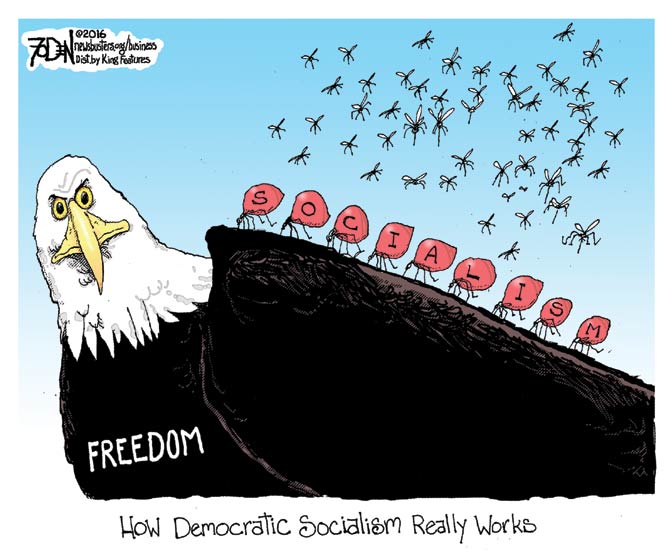
Socialism is having a moment.
I'm not just referring to
Some conservatives aren't surprised. Schools have been force-feeding left-wing propaganda to kids like it was feed for geese at a foie gras factory.
On the other hand, what are we to make of the fact that only a fraction of the young people who say they like socialism can explain what it is? If left-wing indoctrination is so effective at getting kids to like socialism, you'd think it would have more success at getting kids to at least parrot back a serviceable definition.
Regardless, this is a familiar tale. Young people have a well-documented tendency of skipping facts and arguments and going straight to conclusions.
Writing in The Federalist,
But when asked if they agreed with a more technically accurate definition of socialism -- government control of the economy -- support dropped considerably (though not nearly enough). Given a choice between a government-managed economy and a free-market economy, millennials overwhelmingly chose the latter. It seems young people realize that putting bureaucrats in charge of Uber wouldn't work too well.
Still, it boggles the mind that anyone can see the folly of having the government take over Amazon or
More intriguing to me is the fact that kids who don't know what textbook socialism is actually have a better understanding of what drives socialism in the first place.
For generations, intellectuals -- real and so-called -- argued that economics was best left to "planners." Time and again, reality -- specifically, the reality dictated by human desires -- refused to be bent to neatly arrayed columns of numbers and well-stacked slips of paper. The philosopher-economist
And each time the planners insisted that if they just had a little bit more power, a bit more data, a few more resources, they could make planning work. When all you have is a hammer, you're inclined to believe that there's no problem a few more nails won't fix.
The
The unrealism of socialism spelled its undoing -- for a time.
The dilemma is that there is a reality underneath the fraud of scientific socialism. The first socialists were not economists or technocrats. They were romantics and nostalgists. They loathed the relentless logic of the market and its reward of merit and efficiency as judged by the marketplace.
They wanted to return to the imagined Eden of the noble savage and the state of nature. They wanted to live in a world of tribal brotherhood and mutual love. Long before the math of "scientific socialism" there were the emotions of socialism, both light and dark: egalitarianism and envy.
Young people understandably are drawn by the promise of "being together." But they think the federal government can make it happen. If government planners can't even provide goods and services efficiently, how will they ever provide togetherness?
Comment by clicking here.
Jonah Goldberg is a fellow at the American Enterprise Institute and editor-at-large of National Review Online.



 Contact The Editor
Contact The Editor
 Articles By This Author
Articles By This Author